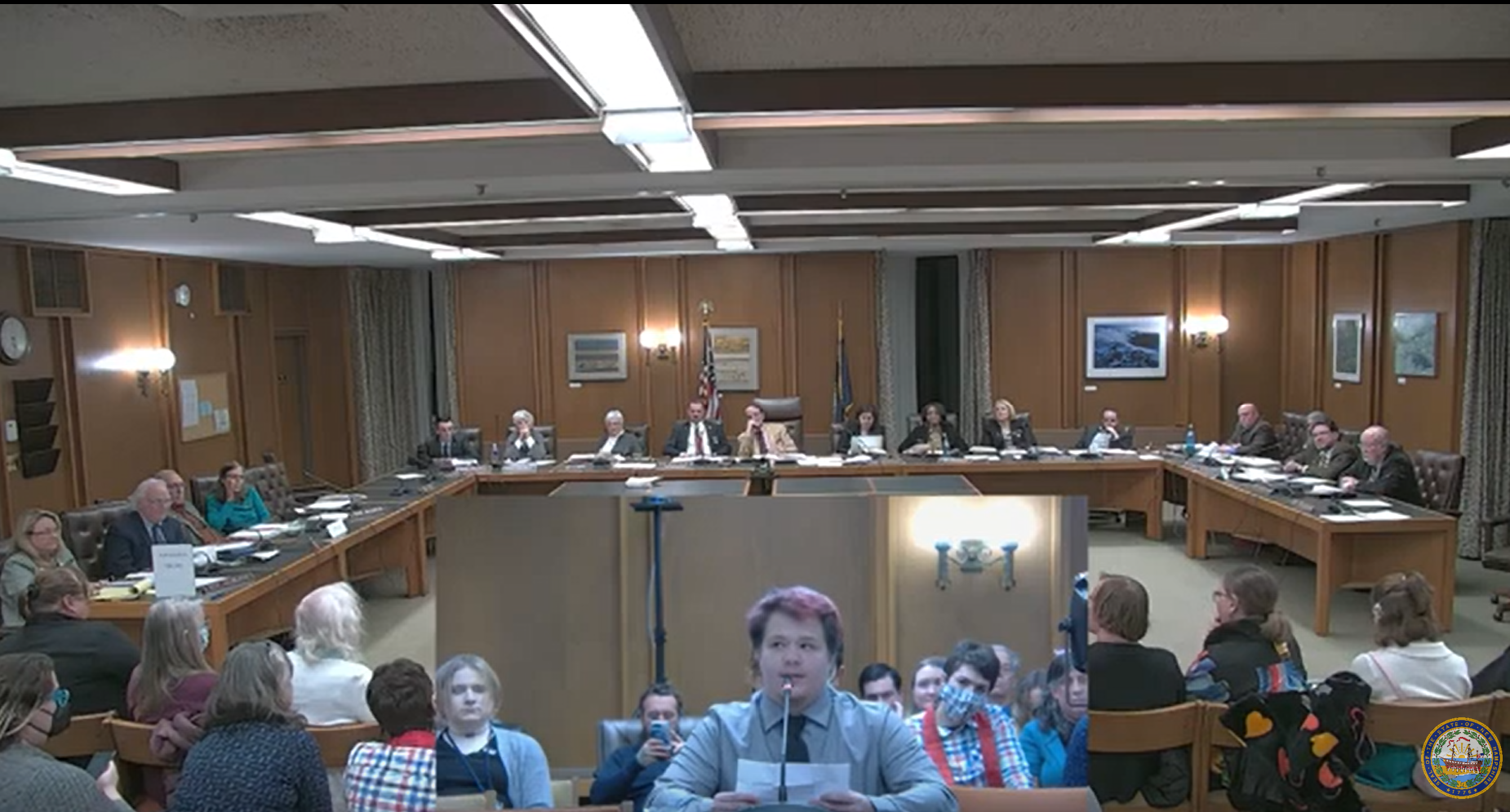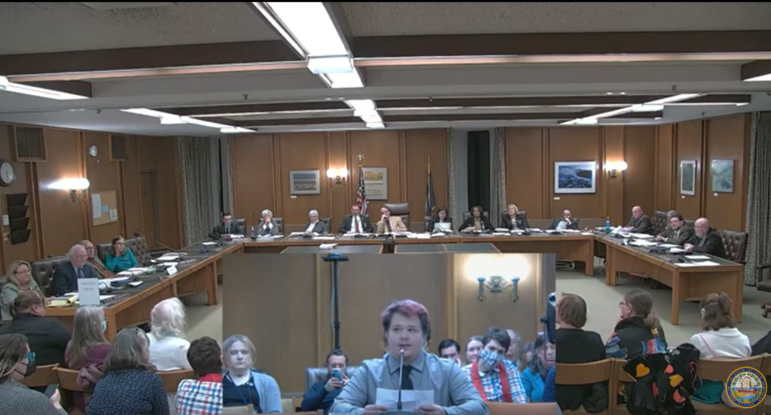LGBTQ+ activists seek to build on HB 396 retention vote this week
In an 11-9 vote last month, the House Judiciary Committee voted to retain HB 396, a bill that sought to allow, but not require, public organizations, primarily school districts and correctional facilities, usage of biological gender as the criterion for access to gender-specific places such as bathr


CONCORD, NH – LGBTQ+ activists are seeking additional legislative victories this Tuesday, hoping to follow an unexpected victory several weeks earlier.
In an 11-9 vote last month, the House Judiciary Committee voted to retain HB 396, a bill that sought to allow, but not require, public organizations, primarily school districts and correctional facilities, usage of biological gender as the criterion for access to gender-specific places such as bathrooms, locker rooms or prisons.
Bill sponsor Jim Kofalt (R-Wilton) told the committee that the bill came from a discussion a year earlier when a transgender colleague said that people believed they should not exist. Kofalt felt that this was wrong and sought to introduce the bill as a balance between protecting the rights and dignity of that and other transgender people while also protecting people who may not feel comfortable in certain areas with people who they feel do not share their gender.
The majority of online testimony was opposed to the bill (186 in favor, 425 in opposition, one neutral), and in-person opposition outnumbered support by a 19-5 margin, with New Hampshire Assistant Attorney General Sean Locke also providing informational testimony.
Opposition to the bill focused on the bill’s failure to address its intended goals: providing a sense of safety for some individuals and respect for transgender individuals, doing nothing on the first point and actually making things worse on the second point.
“The bill in and of itself does harm,” said Louise Spencer of the Kent Street Coalition. “Whether it goes into law or not, this is painful to have your very identity being dragged before a committee and having to identify yourself. It’s humiliating, not promoting dignity.”
Supporters of the bill during public testimony disagreed on the matter of providing safety, stating that individuals have self-identified as transgender women solely to harass or sexually assault cisgender women. There were also other supporters stating that improper gender identification has caused complications during medical procedures when it was not disclosed, a statement that was challenged by opponents of the bill.
When the committee held executive session on the bill almost two weeks later, opinion on the bill divided largely along partisan lines.
Kristine Perez (R-Londonderry) felt that as a female, she had a right to go into a bathroom without seeing males, also sharing anecdotes of widespread issues regarding inappropriate bathroom use questioned by Democrats. She and other Republicans such as Joe Alexander (R-Goffstown) appreciated that the scope of the bill was narrowed by an amendment limiting biological gender limitations to just bathrooms, locker rooms and prisons. Other Republicans, such as Walter Stapleton (R-Claremont), felt that any issues with the bill should receive debate before the full house.
Democrats expressed concern with the lack of definitions regarding gender in the bill, with added concern regarding limiting people into being defined as either male or female when other gender definitions may be more appropriate.
Marjorie Smith (D-Durham) felt that the bill hearkened back to Jim Crow laws in the 20th Century where certain people were not allowed into bathrooms due to their skin color in an attempt to allow the general public to not have to address their lack of civil rights.
A motion recommending that the bill ought to pass as amendment (OTPA) failed on a 10-10 party-line vote, with Dan Eaton (D-Stoddard), filling in for Cam Kenney (D-Durham).
That was followed by an 11-9 motion to retain the bill, with Dave Testerman (R-Franklin) joining Democrats. Testerman, who stated during the OTPA discussion only a small amount of people would be impacted by the bill if it passed, indicated later in the month that he questioned the ability of an OTPA motion to pass the full house given the almost even partisan split, feeling that further work on the bill could help its chances at passage.
Opponents of the bill were pleased with the retention decision.
“The trans community– and everyone who supports nondiscrimination and inclusion– can breathe a sigh of relief that HB 396 won’t be voted on until the fall. We encourage the committee to recommend that the bill does not advance, as it would remove nondiscrimination protections in athletics, incarceration, and bathrooms and locker rooms,” said Linds Jakows, co-founder of 603 Equality. “The overwhelming majority of people who testified on this bill know that anti-trans fear mongering is threatening and divisive. Transgender people are not.”
Timothy Horrigan (D-Durham), a state representative on the committee, wanted to kill the bill but was glad it was retained and respected Testerman for his decision. While he also did not understand what could be accomplished with further study on the bill, he also felt a floor debate was inappropriate given the controversial nature of the bill.
“The House Republicans leaders are asking us to take drastic action which will make trans people’s lives even more difficult than they are already are— based on a second or third-hand anecdote which is my opinion totally unbelievable,” he said. “Hopefully, things will have calmed by next January when HB 396 finally reaches the floor.”
Supporters of the bill voiced frustration with Testerman’s vote.
Cornerstone Action, a faith-based advocacy organization, feared that a situation similar to the one that occurred in Virginia several years ago could occur in New Hampshire. There, a female student was sexually assaulted by a transgender teenager, with the female student’s father arrested for disorderly conduct for addressing his concerns to a school board.
“Rep. Testerman has chosen his side: not wronged fathers, but the powerful people who threaten them. If a similar event occurs in New Hampshire in the coming years—as HB 396 languishes in Rep. Testerman’s bad faith “study committee”—Granite Staters will know who is responsible,” said Cornerstone in a statement following the vote.
Four bills are expected to address transgender issues on Tuesday: two in the House Health and Human Services and Elderly Affairs Committee (HB 619 and HB 368) and two in the House Children and Family Law Committee (HB 417 and HB 10).




